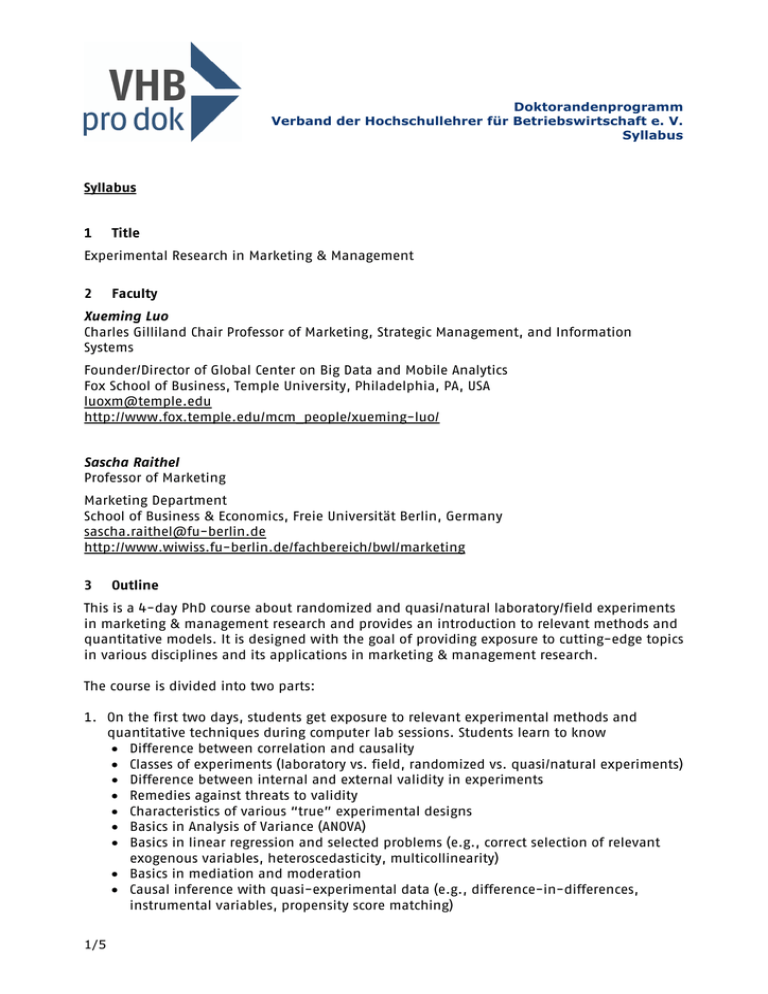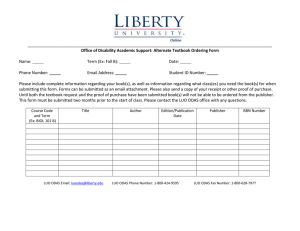VHB-ProDok Syllabus Luo Raithel ERM16
advertisement

Doktorandenprogramm Verband der Hochschullehrer für Betriebswirtschaft e. V. Syllabus Syllabus 1 Title Experimental Research in Marketing & Management 2 Faculty Xueming Luo Charles Gilliland Chair Professor of Marketing, Strategic Management, and Information Systems Founder/Director of Global Center on Big Data and Mobile Analytics Fox School of Business, Temple University, Philadelphia, PA, USA luoxm@temple.edu http://www.fox.temple.edu/mcm_people/xueming-luo/ Sascha Raithel Professor of Marketing Marketing Department School of Business & Economics, Freie Universität Berlin, Germany sascha.raithel@fu-berlin.de http://www.wiwiss.fu-berlin.de/fachbereich/bwl/marketing 3 Outline This is a 4-day PhD course about randomized and quasi/natural laboratory/field experiments in marketing & management research and provides an introduction to relevant methods and quantitative models. It is designed with the goal of providing exposure to cutting-edge topics in various disciplines and its applications in marketing & management research. The course is divided into two parts: 1. On the first two days, students get exposure to relevant experimental methods and quantitative techniques during computer lab sessions. Students learn to know • Difference between correlation and causality • Classes of experiments (laboratory vs. field, randomized vs. quasi/natural experiments) • Difference between internal and external validity in experiments • Remedies against threats to validity • Characteristics of various “true” experimental designs • Basics in Analysis of Variance (ANOVA) • Basics in linear regression and selected problems (e.g., correct selection of relevant exogenous variables, heteroscedasticity, multicollinearity) • Basics in mediation and moderation • Causal inference with quasi-experimental data (e.g., difference-in-differences, instrumental variables, propensity score matching) 1/5 Doktorandenprogramm Verband der Hochschullehrer für Betriebswirtschaft e. V. Syllabus 2. On the last two days, students present selected papers (see list below) and one of their own dissertation projects (including proposals). Topics for dissertation projects include (not exhaustive): • Marketing strategy • Mobile marketing • Brand management • Marketing-information systems interface • Customer relationship management • Digital social media strategy • Corporate social responsibility and sustainability Paper presentations: A team of two students will be assigned to present one paper; focusing on Hypotheses, Model, Data, Contributions; 6 min, PPT based. Presentation of project proposals from PhD students: Hypotheses, Model, Data, Contributions; 30 min; PPT based. Particularly, the learning objectives of the course include: 1) Understand and apply basic empirical methodologies in quantitative research 2) Read and critique the literature on the applications of the above topics in A+ journals. 3) Identify interesting and important research questions in those fields 4) Understand the various models and experimental designs to match different research questions 5) Draft and prepare to submit research projects to top A+ journals in marketing (JM/JMR/MKSC/MGSC), management (SMJ/AMJ), and information systems (ISR/MISQ/MGSC). 2/5 Doktorandenprogramm Verband der Hochschullehrer für Betriebswirtschaft e. V. Syllabus 4 Administration 4.1 Tentative schedule Day 1: June 20th, 2016 [Sascha Raithel] Location: Freie Universität Berlin, Room tbd 13:30 – 15:00 Introduction to course & Correlation vs. causality 15:00 – 15:15 Break 15:15 – 16:45 Experimental designs 16:45 – 17:00 Break 17:00 – 18:30 ANOVA Day 2: June 21st, 2016 [Sascha Raithel] Location: Freie Universität Berlin, Room tbd 09:00 – 10:30 Linear regression and selected problems (I) 10:30 – 10:45 Break 10:45 – 12:15 Linear regression and selected problems (II) 12:15 – 13:30 Lunch (Kaulbachstr. 45, Room E003) 13:30 – 15:00 Mediation & moderation 15:00 – 15:15 Break 15:15 – 16:45 Causal inference with quasi-experimental data (I) 16:45 – 17:00 Break 17:00 – 18:30 Causal inference with quasi-experimental data (II) Day 3: June 22nd, 2016 [Xueming Luo] Location: Freie Universität Berlin, Room tbd 09:00 – 10:30 Paper presentation #1 Presentation and prediscussion of phd student projects #1 #2 10:30 – 10:45 Break 10:45 – 12:15 Paper presentations #2 Presentation and prediscussion of phd student projects #3 #4 12:15 – 13:30 Lunch 13:30 – 15:00 Paper presentations #3 Presentation and prediscussion of phd student projects #5 #6 15:00 – 15:15 Break 15:15 – 16:45 Paper presentations #4 Presentation and prediscussion of phd student projects #7 #8 3/5 Doktorandenprogramm Verband der Hochschullehrer für Betriebswirtschaft e. V. Syllabus 16:45 – 17:00 Break 17:00 – 18:30 Paper presentations #5 Presentation and prediscussion of phd student projects #9 #10 Day 4: June 23rd, 2016 [Xueming Luo] Location: Freie Universität Berlin, Room tbd 09:00 – 10:30 Paper presentations #6 Presentation and prediscussion of phd student projects #11 #12 10:30 – 10:45 Break 10:45 – 12:15 Project intensive training (Projects to be assigned) 12:15 – 13:15 Lunch 13:15 – 15:00 Project intensive training (Projects to be assigned) 15:00 – 15:15 Break 15:15 – 16:45 Project intensive training (Projects to be assigned) Professor Xueming Luo intends to select some students and invite them to work with him on his ongoing projects! 4.2 Location [Freie Universität Berlin, Germany] 4.3 Max. number of participants The number of participant is limited to [12] because of the extensive efforts for the towardpublication submissions to top journals. 4.4 Cost The course fee amounts to EUR 600. 5 Prerequisites Prior exposure to basics in statistics is recommended. 4/5 Doktorandenprogramm Verband der Hochschullehrer für Betriebswirtschaft e. V. Syllabus 6 Course Material Will be provided prior to and during the workshop. # Papers 1 JP Dube, X Luo, and Z. Fang, “Self-Signaling and Prosocial Behavior,” Marketing Science, under review 2 M. Andrews, X Luo, Z. Fang, and A Ghose (2016), “Mobile Ad Effectiveness: HyperContextual Targeting with Crowdedness,” Marketing Science, forthcoming. 3 C. Li, Rienaker, A, Luo X, C Zhang, “Weather and Mobile Ads: A 10-Million-User Field Study” at Marketing Science, under review 4 Nathan Fong, Zheng Fang, and Xueming Luo (2015), “Geo-Conquesting: Competitive Locational Mobile Promotions” Journal of Marketing Research. 52 (October), 726-735. 5 Zhang Y, X Luo, F Zeng, “O2O Coupons and Omnichann Marketing” at Journal of Marketing Research, under review 6 Y Zhang, X Luo, F Zeng, “Sequential Sweepstake Promotions” at Journal of Marketing, under review 7 Hock, S.; Raithel, S.: Negative Celebrity Publicity and Firm Value: How Critical Are Immediate Firm Reactions?, Marketing Science, under review. 8 Fang, Z, B Gu, X. Luo, and Y. Xu (2015), “Contemporaneous and Delayed Sales Impact of Location-Based Mobile Promotions,” Information Systems Research, 26 (September), 552-564. 7 To Prepare To use own laptops during lab sessions, a Stata license is recommended. Beyond the assigned papers to be presented, students are encouraged to read the other papers as well. 8 Assessment The grade will be based on three things: 1. Attendance, class Q&A (25% of the grade) 2. Literature oral presentation and PPTs (25% of the grade) 3. Project oral presentation and PPTs before the intensive training and project implementation during/after the project intensive training (50% of the grade) 9 Credits The course is eligible for 6 ECTS. 5/5
